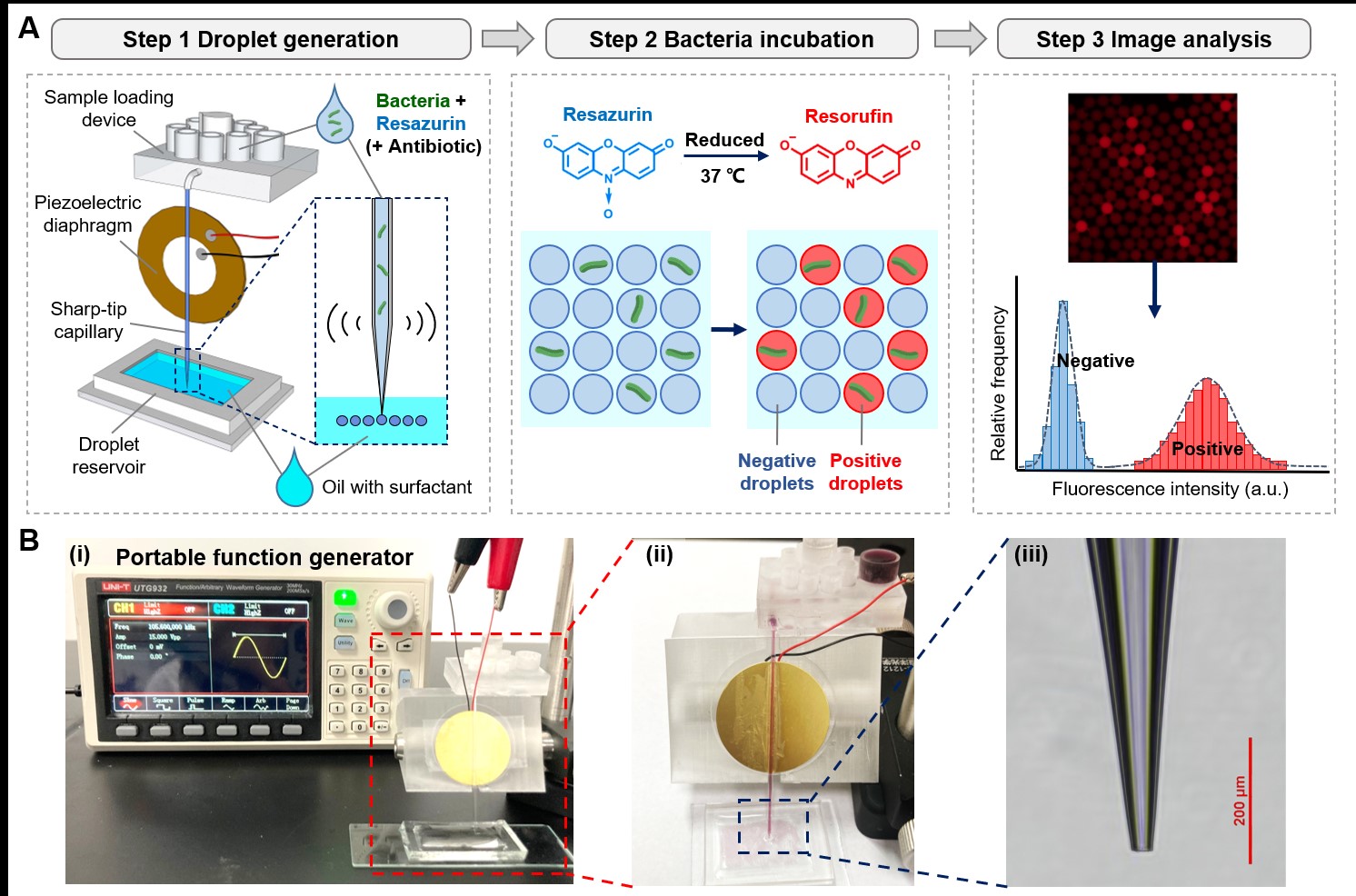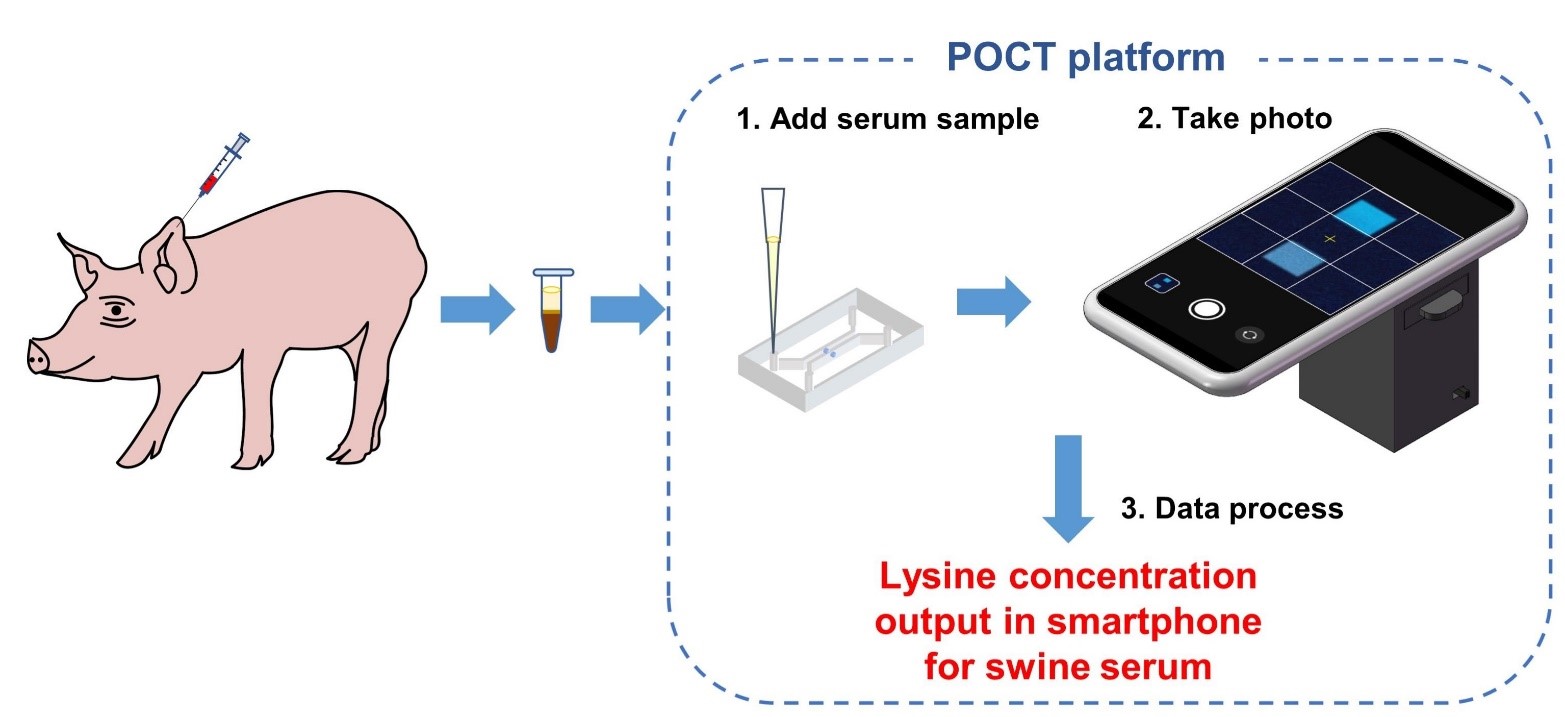南湖新闻网讯(通讯员 刘越)近日,农业微生物资源发掘与利用全国重点实验室、湖北洪山实验室、我校动物育种与健康养殖前沿科学中心晏向华教授团队研究成果以“Precise digital bacteria enumeration and antibiotic susceptibility testing via a portable vibrating capillary-based droplet platform”为题在Sensors and Actuators B: Chemical发表,研究开发了一种基于微流控液滴技术的数字化活细菌计数与抗生素敏感性测试新方法。同时研究人员还研制了一种猪血清中赖氨酸浓度的即时检测装置,相关研究成果以“Point-of-care testing for lysine concentration in swine serum via blue-emissive carbon dot-entrapped microfluidic chip”为题在Animal Nutrition发表。
抗生素耐药性是人类健康的重大威胁,传统的抗生素敏感性测试方法如肉汤稀释法、纸片扩散法等存在检测时间长、样品消耗量大等不足,无法有效满足快速诊断的需求。研发快速、准确、便携的细菌抗生素敏感性测试方法与平台,对于生猪健康养殖过程中规定的“饲料端无抗、养殖端减抗、产品端无抗”的抗生素含量和耐药性细菌产生的即时检测具有重要意义。
液滴数字化计数分析(droplet digital counting)是将原始样本分散至大量等体积的纳升级微液滴中,每个液滴作为一个独立的生物反应器,通过对包含待测目标的液滴(阳性液滴)进行识别和计数,根据泊松分布可实现待测目标的绝对定量。由于细菌被限制在纳升级空间中生长,有利于自身及代谢产物的富集,数字化细菌分析与抗生素敏感性测试可以大大缩短信号检测所需的孵育时间。微流控芯片是目前最常用的数字化离散平台,然而现有芯片的制作与操作对专业设备、技能及成本的要求较高,且微液滴的体积和数量难以灵活调节,限制了数字化分析的动态范围和精确度。
研究人员研发了一种声波驱动的可控微液滴生成技术与平台,该平台仅由一根由压电膜片控制的玻璃毛细管、一个便携式信号发生器和一个液滴收集池组成,装置简单、操作简便,且成本低廉。该液滴技术可高通量生成单分散微液滴,通过改变声波信号参数,液滴体积从0.016 nL至26.4 nL连续、实时、灵活可调,可满足多体积数字化细菌计数的需求。利用该技术,研究人员将活性指示剂刃天青与细菌共同包裹于两种不同体积的微液滴中。细菌在液滴中繁殖会使指示剂反应并产生红色荧光;当微液滴经过孵育后,内含活细菌的液滴可显示荧光信号,而未包裹细菌或包裹死细菌的液滴则无明显荧光信号。通过荧光成像,结合自主开发的图像与数据处理程序,可快速实现阳性和阴性液滴的识别与统计,并根据泊松分布,计算出样本中的活细菌浓度。该方法可在5×10 2 CFU/mL至1×10 7 CFU/mL的范围内实现活细菌的快速、准确计数;且与单体积液滴相比,多体积液滴分析极大提高了计数的动态范围和准确性。

研究人员进一步在液滴平台上集成了一个3D打印旋转进样切换装置,通过中央切换阀的旋转,可实现不同样品的灵活切换与液滴生成,满足不同浓度抗生素处理与检测的需求。将细菌、抗生素和指示剂共同包裹于液滴中,通过计算不同浓度抗生素处理下样品中细菌的存活率,拟合得到抗生素浓度与细菌存活率的关系曲线,可以准确评估抗生素的最小抑菌浓度。该方法可将抗生素敏感性测试时间由传统方法的20小时以上缩短至5小时,且通过微液滴体积的灵活调节可实现单个液滴中细菌浓度的精确设置,准确评估细菌初始接种浓度对抗生素敏感性测试结果的影响。
华中农业大学理学院丁驰竹副教授、硕士研究生刘越为共同第一作者,华中农业大学动科动医学院、农业微生物资源发掘与利用全国重点实验室何子怡副研究员、晏向华教授为共同通讯作者。该研究受到了国家自然科学基金、华中农业大学自主科技创新基金和农业微生物重大基础设施项目的资助。
赖氨酸是生长猪必需氨基酸之一,也是玉米-豆粕型日粮的第一限制性氨基酸。在我国豆粕减量替代方案和低蛋白日粮技术推广过程中,赖氨酸若缺乏会限制猪生长性能发挥,但过量补充赖氨酸不仅会造成浪费,还会影响精氨酸、组氨酸等其他氨基酸的吸收和转运。由于赖氨酸缺乏或过量都有负面影响,而赖氨酸需求量是一个涉及多种因素的动态变化量,因此需要一种简单有效的赖氨酸营养状态评定方法。血液中赖氨酸浓度是赖氨酸营养状况的直接反映,但现有的检测方法依赖于氨基酸自动化分析仪,不能满足现场快速检测的要求。
研究人员首先研发了一种氮掺杂碳点作为检测赖氨酸的荧光探针,该探针在紫外激发下能发出蓝色荧光,且荧光强度随赖氨酸浓度增加而增强,具有高的荧光量子产率、稳定性、灵敏度和特异性。接下来,研究人员将该氮掺杂碳点包裹在水凝胶微结构中,作为核心检测元件,设计了用于快速测定赖氨酸浓度的微流控芯片,将一次检测所需的血清样本量降至3 μL。试验结果表明,利用荧光显微镜对该芯片拍照,根据荧光强度变化可以准确测量赖氨酸浓度。

最后,研究人员设计制作了一个成像附件,以提供稳定的激发光和拍照环境,将微流控芯片和智能手机集成为便携式的即时检测平台,通过用智能手机对微流控芯片拍照实现测量。该平台只需3 μL猪血清样品,检出限小于16 μmol/L,满足猪血清中赖氨酸浓度的正常范围,检测时间约3分钟;具有操作简单、反应迅速、成本低、采血量小、减轻猪应激等优点,可用于猪赖氨酸营养状态的动态监测,为我国豆粕减量替代方案和低蛋白日粮技术策略下的精确饲料配方提供依据。
华中农业大学理学院丁驰竹副教授为第一作者,动科动医学院、农业微生物资源发掘与利用全国重点实验室晏向华教授为通讯作者。该研究受到了国家自然科学基金的资助。
审核人:丁驰竹 何子怡 晏向华
【论文1英文摘要】Antibiotic resistance can lead to multidrug-resistant superbugs and threaten global health, putting forward a high demand for accurate and fast antibiotic susceptibility testing (AST). Conventional AST methods are labor-intensive and time-consuming, far from meeting the requirement for rapid clinical decision-making. Here, we develop a portable vibrating capillary-based droplet platform for precise digital bacteria enumeration and rapid AST. Multi-volume droplets encapsulating bacteria with or without antibiotics are generated on demand, and the elevated fluorescence from resazurin reduction is measured, which corresponds to the growing bacteria. Automated data analysis is achieved by a self-developed image processing program. Multi-volume droplet digital counting allows precise bacteria enumeration over a wide dynamic range spanning more than 4 orders of magnitude. Droplet digital AST of ampicillin against E. coli demonstrates that it is feasible for accurately assessing the minimum inhibitory concentration and investigating the inoculum effect, with the assay time reduced to 5 hr. In sum, this method is easy to operate, cost-effective, with high accuracy and short time-to-result, which is highly promising for rapid and precise assessment of antimicrobial susceptibility in resource-limited settings.
论文1链接:https://www.sciencedirect.com/science/article/pii/S0925400522018974
【论文2英文摘要】Lysine is one of the essential amino acids and plays a vital role in the growth, development and health of pigs. Blood lysine concentration is a direct indication of lysine status; however, current methods can not satisfy the demands for rapid and on-site lysine concentration measurement of swine serum. Here, we developed blue-emissive nitrogen-doped carbon dots as a fluorescence probe for the determination of lysine with high fluorescence quantum yield, stability, sensitivity and specificity. The carbon dots were entrapped within hydrogel microstructures to fabricate microfluidic chips for rapid assay for lysine quantification. We further developed an imaging attachment to integrate the microfluidic chip and a smartphone into a portable point-of-care testing platform. This platform requires only 3 μL sample and has a linear detection range of 25 to 300 μmol/L with a limit of detection less than 16 μmol/L, which covers the normal range of lysine concentration in swine serum. We tested lysine concentration in swine serum using this platform with high accuracy, low sample consumption, and within 3 min. Together, these results may provide a rapid and portable platform for dynamic monitoring of swine lysine status and contribute to precise feed formula modulation with low-protein diet strategy.
论文2链接:https://www.sciencedirect.com/science/article/pii/S2405654522001433
